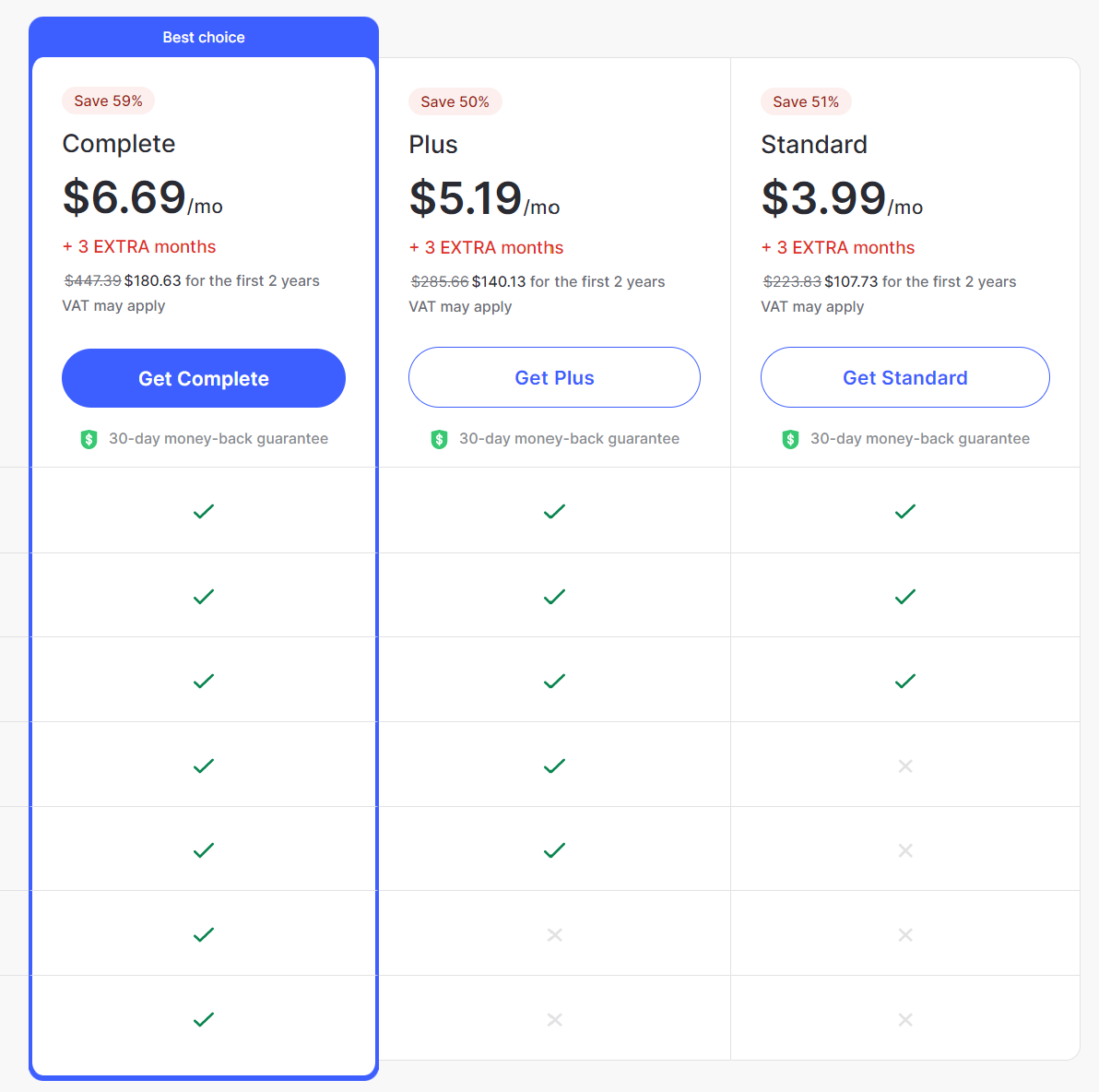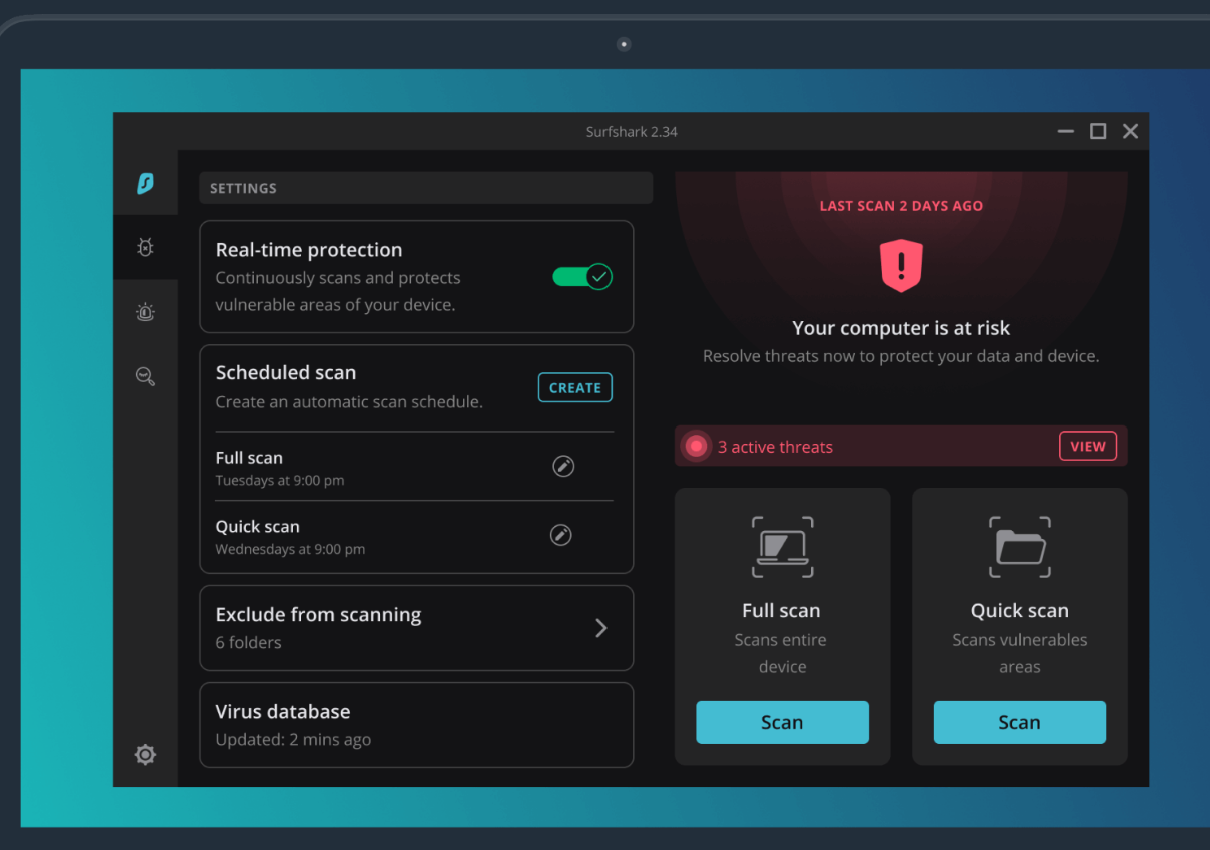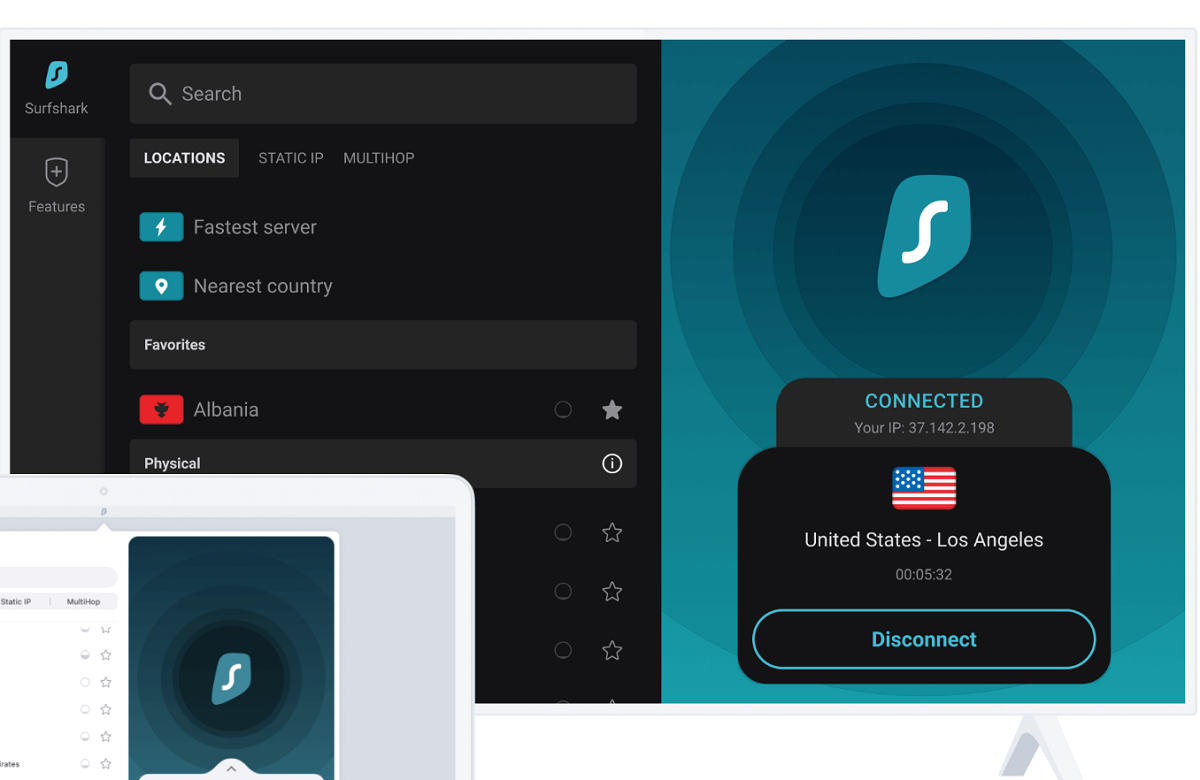While there are many VPN services available in the market, two popular VPN services that have gained significant attention in recent years are Surfshark and NordVPN. In this in-depth comparison, we will explore the features, performance, pricing and overall user experience of Surfshark vs NordVPN to help you decide the most suitable option for your needs.
Jump to:
What is NordVPN?

NordVPN provides users with enhanced online privacy and security through many network security functions. Some key features include threat protection, which protects your systems from malicious URLs and deals with trackers and intrusive ads and a dedicated IP allowing users remote access to their work applications. There is also a dark web monitor that alerts users when they are compromised and a “meshnet” feature which provides safe access to other devices for secure file sharing and active work collaboration. NordVPN is also compatible with multiple devices such as Windows, macOS, Android, iOS and Linux, and permits users to connect up to six devices to one account.
What is Surfshark VPN?

Surfshark VPN is an excellent option for businesses seeking a reliable VPN to secure their connection to the internet. This service allows unlimited device connections and supports various platforms such as Windows, macOS, Linux, Android, and iOS.
Surfshark provides features such as incognito mode internet search, which enables users to search the internet without being tracked and ad-free, an antivirus/malware scanner, and threat notification that alerts users when there is a new breach.
Surfshark vs NordVPN: Comparison Table
Here is a comparison table summarizing how NordVPN and Surfshark compare with each other.
| Feature | NordVPN | Surfshark |
|---|---|---|
| Dedicated IP | Yes | Yes |
| Threat protection | Yes | Yes |
| Kill switch | Yes | Yes |
| Server network | Over 5,683 in 60 countries | 3,200+ servers in 100 countries |
| DNS leak protection | Yes | Yes |
| Data breach alert | Yes | Yes |
| Simultaneous connections | Up to six devices to one account | Unlimited devices |
| Pricing | Starts at $3.99/month for two-year plan | Starts at $2.49/month |
Surfshark Pricing
Below is a summary of each VPN software’s pricing model.
Surfshark VPN offers pricing on a monthly or annual subscription, with all plans offering a 30-day money-back guarantee.
- Monthly plan: Starts at $12.95 per month.
- 12-month plan: Starts at $3.99 per month.
- 24-month plan: Starts at $2.39 per month, billed at $59.76 at purchase and then annually after the first 25 months.
NordVPN Pricing
NordVPN is also available on monthly, one-year and two-year subscriptions. Under each subscription option are three packages – Standard, Plus and Complete.
| Packages | Monthly plan | 1-year plan | 2-year plan |
|---|---|---|---|
| Standard | $12.99/month | $4.59/month, plus 3 extra months, billed at $68.85 for the first year. | $3.99, plus 3 extra months, billed at $107.73 for the first two years. |
| Plus | $14.19/month | $5.79/month, plus 3 extra months, billed at $86.85 for the first year. | $5.19, plus 3 extra months, billed at $140.13 for the first two years. |
| Complete | $15.69/month | $7.29, plus 3 extra months, billed at $109.35 for the first year. | $6.69 plus 3 extra months, billed at $180.63 for the first two years. |
Figure B

Feature Comparison: Surfshark vs NordVPN
Here’s a comparison between NordVPN and Surfshark, focusing on six key features:
Server network
Both NordVPN and Surfshark have extensive networks spread across multiple countries. NordVPN has a larger network, with over 5,000 servers in 60 countries, while Surfshark offers over 3,200 servers in 100 countries. NordVPN’s larger server network may provide more options for users in terms of server locations and potential connection speeds. Surfshark, while having a slightly smaller network, still offers a substantial number of servers spread across more countries.
Security and privacy features
Both NordVPN and Surfshark prioritize security and privacy. They offer similar encryption protocols, including AES-256 encryption, as well as support for secure VPN protocols like IKEv2/IPSec. They both have a strict no-logs policy, meaning they do not collect or store user activity logs. Additionally, both providers offer features like kill switch, DNS leak protection, and malware blocking, all contributing to a more secure internet connection.
Simultaneous connections
NordVPN allows you to connect up to six devices simultaneously with a single subscription. This means you can protect multiple devices, such as your smartphone, tablet, laptop, and more, all at the same time. Surfshark, on the other hand, offers even more generous simultaneous connections. With Surfshark, you can connect an unlimited number of devices with just one account, allowing you to secure all your devices without limitations. This makes Surfshark an excellent choice for users with multiple devices.
Malware and ad blocking
NordVPN includes a cybersecurity feature that provides protection against malware, phishing attempts, and intrusive advertisements. It helps block potentially harmful websites, malicious ads, and other online threats. Surfshark also offers a similar feature called CleanWeb, which blocks ads, trackers and malware-infected sites to enhance your browsing experience and protect against threats. (Figure_C)
Figure C

User interface and ease of use
Both NordVPN and Surfshark offer user-friendly apps with intuitive interfaces. They have apps available for various platforms, including Windows, Mac, iOS, Android and more. Surfshark’s interface is known for its simplicity and ease of use, making it an excellent choice for less technical users. NordVPN’s interface is also user-friendly, although it offers more advanced customization options.
Surfshark pros and cons
Although Surfshark has many exciting features, it still has some weaknesses. Highlighted below are some of the pros and cons.
Pros
- Unlimited simultaneous connections, allowing you to secure multiple devices.
- CleanWeb feature for blocking ads, trackers and malware.
- Easy-to-use interface, suitable for beginners.
- Strong encryption and privacy features.
- 24/7 customer support.
Cons
- Smaller server network compared to NordVPN.
- May require trying different servers to access specific streaming content.
- Limited customization options compared to NordVPN.
- Occasional fluctuations in connection speeds.
Figure A

NordVPN pros and cons
NordVPN, despite its many features, also has some drawbacks.
Pros
- One VPN account secures six devices.
- Offers secure device-to-device connection through Meshnet.
- Available on multiple devices and browsers.
- Provides a dedicated IP.
- Offers over 5000 NordVPN servers in 60 countries.
Cons
- Slightly higher pricing compared to Surfshark.
- Some advanced features may be overwhelming for casual users.
- Occasional slower connection speeds on certain servers.
Methodology
To present a fair comparison of both VPN products, we evaluated the key features each solution offers, their pricing structure and ease of use. We also studied reliable third-party reviews to determine how each product resonates with verified buyers.
Should your organization use Surfshark or NordVPN?
The choice between Surfshark and NordVPN for your organization depends on various factors and considerations, such as security capability, server network size, pricing and how many connections each allows. Here are a few points to note when you have to pick between the two.
Security and privacy requirements
Assess your organization’s security and privacy needs. Both Surfshark and NordVPN offer strong security features, such as AES-256 encryption and secure tunneling protocols, threat detection and data breach alert capability. Also, consider if your organization requires specific security measures, such as multi-hop VPN connections or dedicated IP addresses, which may vary between the two providers.
Number of simultaneous connections allowed
You should consider how many simultaneous connections your organization requires. Surfshark allows unlimited simultaneous connections, which can be beneficial if you have multiple devices or employees who need VPN access. NordVPN, on the other hand, offers a maximum of six simultaneous connections with a single subscription. While an unlimited simultaneous connection may sound exciting, you should note that when multiple users or devices are connected to a VPN simultaneously, it increases the overall network traffic and can lead to congestion. This congestion can result in higher latency, meaning that data packets take longer to travel between the VPN server and the connected devices.
Server coverage
Evaluate the server network of each provider in terms of size and geographical coverage. If your organization requires access to specific locations or regions, check if both Surfshark and NordVPN have servers in those areas. Additionally, consider the server capacity and performance to ensure smooth and reliable VPN connections for your organization’s needs.
User experience and interface
Consider the user experience and interface of the VPN clients provided by Surfshark and NordVPN. If possible, test their apps and evaluate if they are user-friendly, intuitive and compatible with the devices and platforms used within your organization. A well-designed and easy-to-use interface can contribute to smoother VPN deployment and adoption and reduce the times you will need to call the support desk of the VPN provider.
Consider your budget and pricing
Compare the pricing plans offered by Surfshark and NordVPN. Consider your organization’s budget and evaluate which provider offers the best value for the features and capabilities required. Take into account any promotional offers or discounts that may be available at the time of your decision.
Considering the factors outlined above, it’s expected that you can now make an informed decision between the two VPN solutions based on your unique needs and priorities.
1
Twingate
Twingate helps fast-growing companies easily implement a Zero Trust secure access solution without compromising security, usability, or performance. We believe that “Work from Anywhere” should just work. Twingate’s secure access platform replaces legacy VPNs with a modern Identity-First Networking solution that combines enterprise-grade security with a consumer-grade user experience. It can be set up in less than 15 minutes and integrates with all major cloud providers and identity providers.
Read next: Best VPNs for small business in 2023


